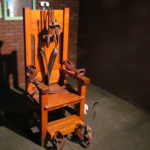Posted: 3/18/05
| Soloist Thomas J. Freeman sings with the choir at Mount Zion Church in Killen, Ala. (Photo by Robin Conn) |
Jazz roots' call-and-response grew in Scottish soil
By Chuck McCutcheon
Religion News Service
KILLEN, Ala. (RNS)–When 10 members of the all-black choir at Mount Zion Church in Killen, Ala., flew to Scotland recently on their first overseas trip, they were treated like long-lost family members.
“They really, really loved us,” said Docary Ingram, pastor of the Presbyterian congregation. “Everything we did, they paid for. We did more kissing in one day than I did in the U.S. in my whole life. … I pray to God we can go back.”
 |
The warm cross-cultural reception occurred because the Alabamians and the Scots share an obscure, and virtually extinct, musical tradition–one that some experts say influenced the evolution of American music.
Jazz artist Willie Ruff, a Yale University music professor, is convinced that “presenting the line”–the unaccompanied singing of psalms in Gaelic by Presbyterians of the Scottish Hebrides–is the direct ancestor of “lining out,” a hymn-singing style of 19th century slaves still practiced at a dwindling number of black Southern churches.
Ruff believes “lining out” evolved into the call-and-response of spirituals and gospel music that, in turn, influenced other American musical styles.
In traditional line singing, a designated person sings a line solo from Psalms, inviting congregation members to follow in their own time and with their own harmonies.
The result is an echoing, surging and radiant chorus that critic Jo Morrison compared to “waves of music crashing against the walls of the church, washing the entire congregation in a sea of sound. … The basic stuff that would later be spirituals, blues, ragtime, jazz, bebop–everything else that came later has some of this genetic DNA.”
As many as 50,000 Gaelic immigrants from Scotland settled in the 18th and 19th centuries in North Carolina's Cape Fear region and other parts of the South. When they worshipped, their slaves sat in the balcony while they sang below.
“When the slaves went to church, that's the way they were taught to sing because the white people didn't have any other way of doing it,” said Jamie Reid-Baxter, a research fellow at Glasgow University who studies Gaelic psalms.
Gospel singer Bobby Jones of Nashville, who hosts a weekly show on Black Entertainment Television, is intrigued by the connection.
“It was interesting to listen to the tapes of the African-Americans singing the long-meter hymns and then listening to the Scottish versions,” Jones said. “Yes, they were very close to being the same, so who knows? We learn from each other, which is a good thing.”
The connection between Scotland and America received little notice until the Scottish media began reporting on Ruff's research. Several television documentaries have been filmed on the subject, and the Internet has helped feed a debate over the possible links.
Some news accounts said his findings prove the Scots invented gospel, something Ruff called an overstatement. He noted that the lining-out tradition started in England and predates gospel by two centuries.
But if he is correct, gospel and other American musical forms have an antecedent from somewhere besides the slaves' native Africa.
“The remarkable thing to me is that in the 21st century, the only people in the English-speaking world that are still doing this in separate languages are the ones that are both the most marginalized–the blacks here, and then these Gaels over in Scotland,” he said.
Ruff, 72, got interested in the issue two years ago when visiting his hometown of Sheffield, a few miles from Killen. Hearing about a place that served tasty catfish suppers, he found his way to Mount Zion.
Once there, he was stunned to hear Presbyterians lining out the way he remembered Baptists singing in the churches he attended more than 60 years ago. “This music is so strong. I reacted just like I did when I was a kid, and I started bawling,” he said.
After several Scottish singers traveled to Killen last summer to hear the singing there, they invited Mount Zion members to visit them. A Scottish documentary filmmaker contributed money for their expenses, and the singers put up their American guests in their homes.
“These people wear their hearts on their sleeves. That's what we liked about them,” said Calum Martin, a Gaelic singing teacher who was among the hosts and who runs a website, www.gaelicpsalmsinging.com. “I think they were overwhelmed by (the reception), but it was genuine.”
The Alabamians did let their hosts know that they don't button up their emotions in church.
“Their preacher said to me, 'You might have to tone it down. We're not used to saying 'Amen' and 'Praise the Lord,'” Ingram recalled. “I said, 'I don't mean no harm, but we didn't come 4,000 miles just to be quiet.'”
















We seek to connect God’s story and God’s people around the world. To learn more about God’s story, click here.
Send comments and feedback to Eric Black, our editor. For comments to be published, please specify “letter to the editor.” Maximum length for publication is 300 words.